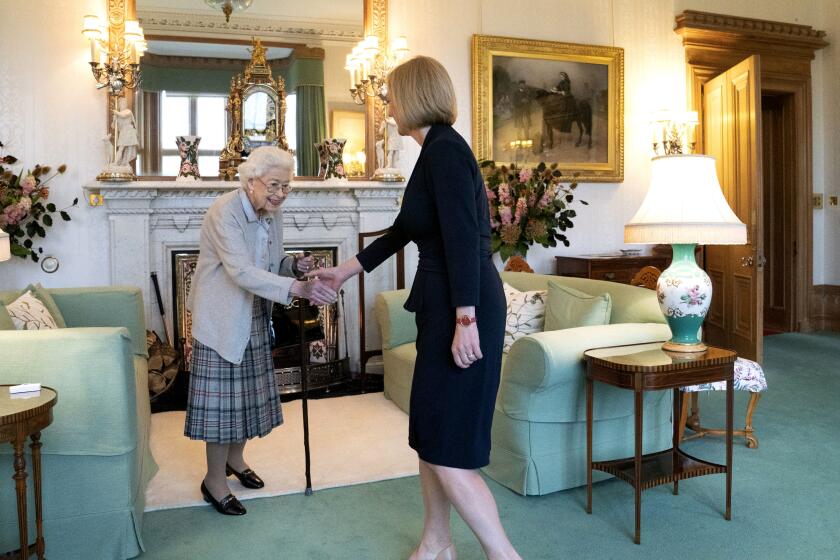U.K. Prime Minister Liz Truss resigns after fiscal plans cause turmoil

The move comes after a tumultuous six-week term in which her policies triggered turmoil in financial markets and a rebellion in her party obliterated her authority.
LONDON — British Prime Minister Liz Truss resigned Thursday — bowing to the inevitable after a tumultuous six-week term in which her policies triggered turmoil in financial markets and a rebellion in her party obliterated her authority.
She said, “I cannot deliver the mandate on which I was elected.”
Just a day earlier Truss had vowed to stay in power, saying she was “a fighter and not a quitter.” But Truss couldn’t hold on any longer after a senior minister quit her government with a barrage of criticism and a vote in the House of Commons descended into chaos and acrimony just days after she was forced to abandon many of her economic policies.
Her departure leaves a divided Conservative Party seeking a leader who can unify its warring factions.
A stumbling British pound and surging U.S. dollar have left Brits feeling glum and plenty of Americans feeling gleeful.
A growing number of lawmakers had called for Truss to resign after weeks of turmoil sparked by her economic plan. The plan unveiled by the government last month triggered financial turmoil and a political crisis that has seen the replacement of Truss’ Treasury chief, multiple policy U-turns and a breakdown of discipline in the governing Conservative Party.
Earlier, Conservative lawmaker Simon Hoare said the government was in disarray.
“Nobody has a route plan. It’s all sort of hand-to-hand fighting on a day-to-day basis,” he told the BBC on Thursday. He said Truss had “about 12 hours” to turn the situation around.
Truss had held a hastily arranged meeting in her 10 Downing Street office with Graham Brady, a senior Conservative lawmaker who oversees leadership challenges. Brady was tasked with assessing whether the prime minister still has the support of Tory members of Parliament — and it seemed she did not.
A growing number of Conservative members of Parliament had called Thursday for her to step down and end the chaos.
“It’s time for the prime minister to go,” lawmaker Miriam Cates said. Another, Steve Double, said of Truss: “She isn’t up to the job, sadly.” Legislator Ruth Edwards said “it is not responsible for the party to allow her to remain in power.”
Lawmakers’ anger grew after a Wednesday evening vote over fracking for shale gas — a practice that Truss wants to resume despite opposition from many Conservatives — produced chaotic scenes in Parliament.
With Conservatives holding a large parliamentary majority, an opposition call for a fracking ban was easily defeated. But there were displays of anger in the House of Commons, with party whips accused of using heavy-handed tactics to gain votes.
Chris Bryant, a lawmaker from the opposition Labor Party, said he “saw members being physically manhandled ... and being bullied.” Conservative officials denied there was manhandling.
Liz Truss has become Britain’s new prime minister, the third woman to hold the post and the fourth Conservative to assume the office in 12 years.
Rumors swirled that Conservative Chief Whip Wendy Morton, who is responsible for party discipline, and her deputy had resigned. Hours later, Truss’ office said both remained in their jobs.
Newspapers that usually support the Conservatives were vitriolic. An editorial in the Daily Mail was headlined: “The wheels have come off the Tory clown car.”
International Trade Secretary Anne-Marie Trevelyan, sent onto the airwaves Thursday morning to defend the government, insisted the administration was providing “stability.” But she was unable to guarantee Truss would lead the party into the next election.
“At the moment, I think that’s the case,” she said.
With opinion polls giving the Labor Party a large and growing lead, many Conservatives now believe their only hope of avoiding electoral oblivion is to replace Truss. But they were divided about how to get rid of her, and over who should replace her.
The party is keen to avoid another divisive leadership contest like the race a few months ago that saw Truss defeat ex-Treasury chief Rishi Sunak. Among potential replacements — if only Conservative lawmakers can agree — are Sunak, House of Commons leader Penny Mordaunt and newly appointed Treasury chief Jeremy Hunt.
A national election doesn’t have to be held until 2024.
In a major blow, Home Secretary Suella Braverman resigned Wednesday after breaching rules by sending an official document from her personal email account. She used her resignation letter to lambaste Truss, saying she had “concerns about the direction of this government.”
“The business of government relies upon people accepting responsibility for their mistakes,” she said in a thinly veiled dig at Truss.
Braverman was replaced as home secretary, the minister responsible for immigration and law and order, by former Cabinet minister Grant Shapps, a high-profile supporter of her defeated rival Sunak.
The dramatic developments came days after Truss fired her Treasury chief, Kwasi Kwarteng, on Friday after the economic package the pair unveiled Sept. 23 spooked financial markets and triggered an economic and political crisis.
The plan’s 45 billion pounds ($50 billion) in unfunded tax cuts sparked turmoil on financial markets, hammering the value of the pound and increasing the cost of U.K. government borrowing. The Bank of England was forced to intervene to prevent the crisis from spreading to the wider economy and putting pension funds at risk.
On Monday Kwarteng’s replacement, Hunt, scrapped almost all of Truss’ tax cuts, along with her flagship energy policy and her promise of no public spending cuts. He said the government will need to save billions of pounds and there are “many difficult decisions” to be made before he sets out a medium-term fiscal plan on Oct. 31.
Speaking to lawmakers for the first time since the U-turn, Truss apologized Wednesday and admitted she had made mistakes during her six weeks in office, but insisted that by changing course she had “taken responsibility and made the right decisions in the interest of the country’s economic stability.”
Opposition lawmakers shouted, “Resign!” as she spoke in the House of Commons.
Labor Party leader Keir Starmer accused the Conservatives of lacking “the basic patriotic duty to keep the British people out of their own pathetic squabbles.”
He said that amid a worsening a cost-of-living crisis, “Britain cannot afford the chaos of the Conservatives anymore. We need a general election now.”
More to Read
Sign up for Essential California
The most important California stories and recommendations in your inbox every morning.
You may occasionally receive promotional content from the Los Angeles Times.












